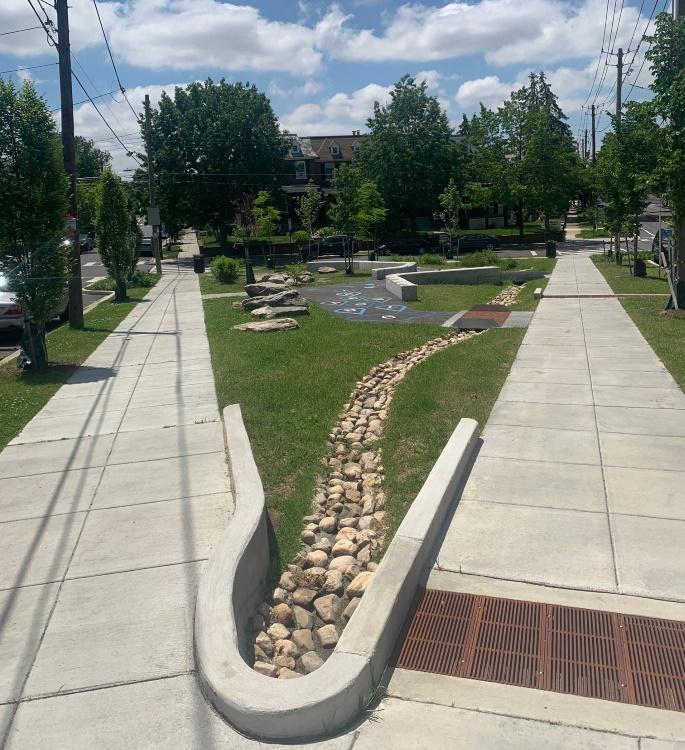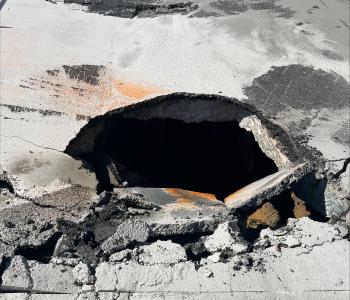DC Water Submits Practicability Assessment for Rock Creek Green Infrastructure Project

DC Water has submitted to the US Environmental Protection Agency (EPA) the Practicability Assessment for the Rock Creek Green Infrastructure (GI) project as required under the terms of the 2016 Amended Consent Decree. The Practicability Assessment evaluates the first set of GI projects in Rock Creek and identifies DC Water’s proposed plan to control the largest combined sewer overflow (CSO) to Rock Creek, which is the Piney Branch outfall.
DC Water is implementing the Clean Rivers Project to control CSOs to our waterways and to improve water quality. The project will provide a 96% reduction in CSOs system-wide when completed.
On January 14, 2016, DC Water, in conjunction with the United States Environmental Protection Agency, United States Department of Justice, and the District Government signed a modification to the 2005 Long Term Control Plan (LTCP) Consent Decree to evaluate innovative GI practices to control the Piney Branch Outfall in Rock Creek instead of building a 9.5 million-gallon storage facility.
The modification required constructing a GI demonstration project in the Rock Creek sewershed and then evaluating the results to determine the best path forward for controlling this CSO. DC Water has completed the evaluation and determined that while full implementation of GI in the Rock Creek sewershed is practicable from a constructability, operability, public acceptability, and efficacy perspective, it is not practicable from a cost to ratepayers perspective. The cost to construct, operate and maintain the full implementation of 365 acres of GI in the urban area is nearly twice as expensive over a 30 year period compared to the gray alternative. Ratepayers are making an enormous investment in CSO control and there are significant hardships among many facets of the community. Affordability considerations and DC Water’s fiduciary responsibility to ratepayers dictate that a GI-only solution for this CSO is impracticable.
While it is impracticable to control this CSO with an all green solution, it is both practicable and advantageous to select the right mix of green and gray controls to maximize benefits. DC Water is proposing a “hybrid” approach for controlling CSOs in the Rock Creek sewershed that blends the best of gray and green technologies. This approach provides the same degree of control as the “all gray” alternative, while lowering capital costs below the “all gray” or “all green” alternatives. This hybrid approach is responsible to District ratepayers and delivers additional triple bottom line benefits such as more green space, habitat creation for birds and pollinators, and more local green jobs as compared to the all gray option.
David L. Gadis, CEO and General Manager, of DC Water stated, “The hybrid approach outlined in the report continues to support and advance DC Water’s commitment to the success of green infrastructure in the District of Columbia and beyond.”
DC Water’s Hybrid Plan proposes the best features of both green and gray controls, utilizing the same technologies found in the LTCP in an effective and financially responsible manner.
- DC Water has constructed approximately 0.90 million gallons of storage as part of Rock Creek Project No.1. By focusing on targeted GI and downspout disconnection, DC Water would construct an additional 2.1 million gallons for a total of 3 million gallons from DC Water GI under the proposed plan.
- DC Water would construct a 4.2 million gallon storage project at the Piney Branch CSO to control the CSO.
- DC Water, through an allowance in the existing Consent Decree, would credit the 2.3 million gallons from GI measures already constructed and paid for by public and private entities in the Piney Branch sewershed pursuant to the District’s Stormwater Regulations.
The Hybrid Plan will be implemented by March 23, 2030, the same schedule deadline in the Amended Consent Decree.
A copy of the Rock Creek Practicability Assessment can be found on DC Water’s website at www.dcwater.com/green. A determination for this recommended approach is pending EPA review. Per the terms of the Consent Decree, EPA has 180 days to review the Practicability Assessment.








